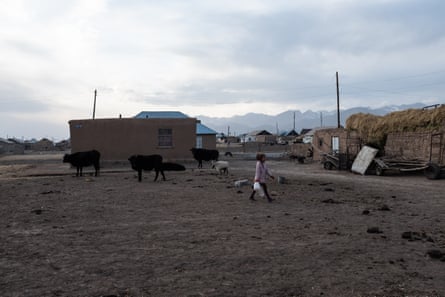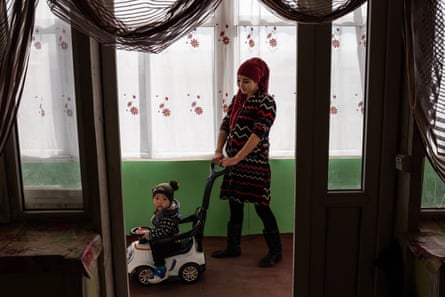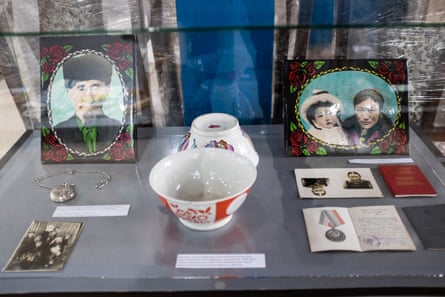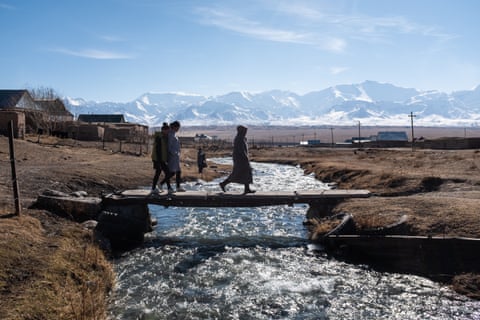It has been over a decade since Umar Tashbekov saw his opportunity. His village, Sary-Mogol in Kyrgyzstan, at an altitude of 3,600 metres, is close to Lenin’s Peak, a popular mountain destination for tourists. If they were already hiking there, why not attract them to visit his village too?
Sary-Mogol is a three-hour drive from the nearest city of Osh, in the country’s south-east. Life here is not easy – short summers and unfavourable growing conditions make it hard to grow much more than potatoes and barley. The main source of work is the large livestock market in town. Others find employment as teachers or in the nearby coal mine. Out of its 5,200-strong population, about 500 people have left for Russia where companies welcome factory workers.




Clockwise from top left: A view of Lenin’s Peak and Sary Mogol village in south-east Kyrgyzstan; a girl carries bottles to fetch water in the village; clothes and other goods are sold at a weekly market, while men trade livestock
An upside to traditional village life, with grandparents, parents and children all living together in the same small houses, has been the slow spread of Covid-19. Because homes are already crowded, people mostly meet up out in the street. That, and the overall government lockdowns, helped keep infection numbers low.

Lake Tulpar-Kul, in the Chon-Alay mountains
But if there has been limited impact on health, the impact on livelihoods is deep. In 2019, more than 1,300 tourists passed through Sary-Mogol. This year, it was fewer than a dozen.
In the last decade, tourism has grown so that almost everyone here is connected to the industry in some way. Receipts from the export of tourism and travel services, which represented almost 6% of GDP in 2018, have been forecast to almost disappear in 2020. Revenues are predicted to fall by as much as 90%.


Left: a sign indicates the yurt camp near Tulpar-Kel lake. Right: yaks roam in a field near the village
Tashbekov opened the village’s first guesthouse in 2007, and invited other villagers to work with him. His company, CBT, soon became an “incubator” for the industry – almost everyone working in tourism has at some point passed through its doors. Soon after, he also opened the area’s first yurt camp, where tourists can stay in 12 traditional Kyrgyz lodgings out in the mountain valley. They enjoy the unique feel of the village – the old Soviet Uaz cars, the ancient ulak tartysh horse game, the markets selling traditional crafts.

The traditional sport of ulak-tartysh in the village of Taldy-Suu, near Sary-Mogol
Then, Tashbekov’s son, Abdilla, took over the business. The 31-year-old has been a guide for more than 10 years. He built his own guesthouse, and was in the process of building a new one. He is always reading and researching on the internet, earning his reputation as the “studious” one. His vision has led to new ideas to develop the town and the family business. He and his father opened a bigger office, which serves as a gathering place for guides, workers and tourists. He organised ski training with other guides to move into winter tourism.
In 2015, he had the idea to start the village’s horse and yak games festival and fair. The entire village attends, either as participants or spectators. Ticket sales bring in revenue for villagers working at the festival – cooking and selling traditional foods, performing traditional music and dancing shows, managing the yurt camp and competing in the games.

Abdilla and his family have lunch at home in Sary-Mogol. Abdilla has been a tour guide for more than 10 years. He built his own guesthouse for visitors and initiated the village’s horse and yak games festival and fair.
All of that momentum has been lost in the wake of the pandemic. Abdilla and his family have felt the economic pain. “The tourist season is dead,” he says. “We had to close the office, yurt camp and guest houses this year.”
His wife works as a music teacher, and they are living off her income, with two children to support. “If tourism does not improve, I will have to go to Osh or some other place to look for work in construction,” he says. That might bring its own set of challenges: the construction sector may soon be another difficult area in which to find jobs.
The UN development programme (UNDP), which this year has launched a set of measures to strengthen adventure tourism in Kyrgyzstan, published a survey that found the most-affected sectors of the economy in Kyrgyzstan will be trade and consumer services and construction, each of which can expect 20% contraction.


Abdilla Tashbekov at the empty office of the CBT tourism company. He took over the business from his father in 2012 but coronavirus has stopped the flow of visitors
Tashbekov’s other son, Ali, 23, began working in the family business at 13, before going to Osh to study logistics and welding. His training has come in handy during the pandemic. When the flow of visitors to the village stopped, he was able to find work as a mechanic in the mine. But he loved working with tourists, meeting people from all over the world.
“It was a good time,” he says. “Sometimes I didn’t have time to come home. After [guiding] one tour, I immediately went with other tourists back to the mountains.”




Ali Tashbekov has been working as a welder at the coalmine during the pandemic instead of in his usual role as a mountain guide. His wife Aizirek Avazova, pictured bottom, has had to stop working in the family’s guesthouse
It was also a healthier job, he says, being outside in nature all day. Now he worries about the effects of the quarry gas he breathes in regularly. But as his wife worked in the now closed guesthouse kitchen, this is the only income they have. With his father recovering from a broken leg, a mother with Parkinson’s disease requiring expensive treatments, a one-year-old child and another on the way, the family’s resources are stretched to the limit.
They are not the only ones feeling the strain in their village.
Midinov Almazbek studied languages on his father’s advice, which allows him to teach English at the local school. During the summer, Almazbek also works as a guide. He took out a bank loan a few years ago to build a guesthouse, which he successfully opened, but in February he took out another loan to expand his business. He expected a normal summer, but with no tourists coming, he is now struggling to pay it back.

Midinov Almazbek and his brother enclose their veranda with wooden planks in Sary-Mogol. Midinov is struggling to repay a loan he took out to build a guesthouse a few years ago
“It’s been a hard year,” he says. “There’s not enough work, and not enough money.”
Buunisa Termechikova, 58, also expected a normal summer. The entrepreneur opened a guesthouse and is skilled at crafts, especially the traditional Kyrgyz woman’s hat. Her new Ethnographic Museum, built by her son in July, is full of local products and historical artifacts. In the absence of foreign visitors, she is using the space for workshops for fellow villagers.




Buunisa Termechikova opened the Ethnographic Museum in Sary-Molog in July. Since visitors dried up during the pandemic, she has been offering workshops in traditional crafts, such as making doll’s hair, to people living in the area
But villagers here still play volleyball in the gym, and take part in horse games, held to celebrate events such as the completion of a new house or the birth of a baby.
Maybe it is this energy and spirit that makes the village attractive to those who visit. Two years ago, a Korean engineer had such a good horse-riding holiday that he funded an initiative upgrading the water infrastructure so that villagers no longer had to carry water from the river.
Everyone in Sary-Mogol looks forward to sharing their energy and spirit with visitors again.

Buunisa Termechikova eats pilaf with her daughter and other guests at home in Burgan-Suu village
Sign up for the Global Dispatch newsletter – a fortnightly roundup of our top stories, recommended reads, and thoughts from our team on key development and human rights issues:
